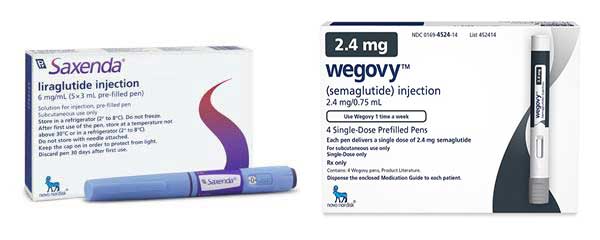The Ministry of Food and Drug Safety (MFDS) is closely watching whether the recent reports about the possibility of glucagon-like peptide 1 (GLP-1) treatments causing suicidal or self-harming thoughts will also affect Korean patients.
The ministry said it asked relevant companies to submit related data.
"We will review the submitted data, the status of overseas measures, and any domestic adverse events before taking necessary measures," a ministry official told Korea Biomedical Review.

The European Medicines Agency (EMA) recently launched an investigation into Novo Nordisk's GLP-1 treatments, including Saxenda (ingredient: liraglutide), Ozempic (ingredient: semaglutide), and Wegovy (ingredient: semaglutide), after the Icelandic Medicines Agency reported two adverse events of suicidal or self-harming behavior in patients taking Saxenda and Ozempic.
The EMA stressed that the review, which started on July 3, has now been extended to include other GLP-1 receptor agonists.
"The review is being carried out in the context of a signal procedure," the agency said. "A signal is information on a new adverse event that is potentially caused by a medicine or a new aspect of a known adverse event that warrants further investigation."
However, the EMA noted that the presence of a signal does not necessarily mean that a medicine caused the adverse event in question.
The EMA’s investigation is to be concluded in November.
Self-harming adverse events in obesity medications are a sensitive issue.
According to the FDA Adverse Event Reporting System (FAERS), there have been 60 adverse events of suicidal ideation reported by patients or healthcare providers taking or prescribing semaglutide since 2018. There have been 70 reports of the same adverse event for liraglutide since 2010.
For such reasons, Novo Nordisk had excluded patients with a history of mental health or suicidal behavior when it conducted its clinical trials for Ozempic and Saxenda.
Regarding the matter, a spokesperson of Novo Nordisk Korea stressed that the company is closely working with the EMA.
"To date, our own safety monitoring has not found any causal link between the drugs and suicidal or self-harm thoughts," she said.
In Korea, Novo Nordisk has obtained the license for Saxenda, Wegovy, and Ozempic but only Saxenda is currently on the market.
A Korean physician said that it is premature to definitively link GLP-1 medication to self-harm or suicidal thoughts.
"It should be taken into account that obese patients are often depressed," a doctor who runs a family medicine clinic in Gangnam-gu, Seoul, told Korea Biomedical Review. "Also, there have been no studies that tie GLP-1 medication to self-harm or suicidal thoughts."
Therefore, research is needed to directly determine if there is a link between GLP-1 treatments and suicidal and self-harming thoughts, he added.
Still, the doctor stressed that while weight loss is important, it's even more important to consult with a doctor to receive the right medication.
"Different doctors may have different prescribing criteria, so it's important to be aware of the side effects and receive a treatment that fits the patient," he said.

